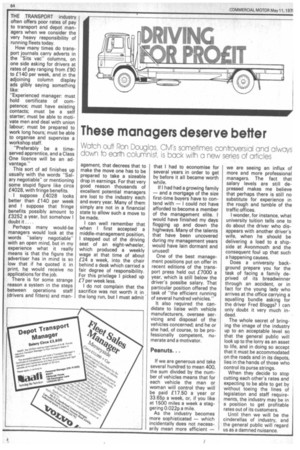These managers deserve better
Page 66

If you've noticed an error in this article please click here to report it so we can fix it.
Watch out! Ron Douglas, CM's sometimes controversial and always down to earh columnist, is back with a new series of articles
THE TRANSPORT industry often offers poor rates of pay to transport and depot managers when we consider the very heavy responsibility of running fleets today.
How many times do transport journals carry adverts in the "Sits vac" columns, on one side asking for drivers at rates of pay ranging from £90 to £140 per week, and in the adjoining column display ads glibly saying something like: "Experienced manager: must hold certificate of competence; must have existing contacts; must be a self starter; must be able to motivate men and deal with union labour; must be prepared to work long hours; must be able to organise and supervise a workshop staff.
"Preferably be a timeserved apprentice, and a Class One licence will be an advantage."
This sort of ad finishes up usually with the words "Salary negotiable" or mentioning some stupid figure like circa £4028, with fringe benefits.
I suppose £4028 looks better than £140 per week and I suppose that fringe benefits possibly amount to £3252 a year, but somehow doubt it ....
Perhaps many would-be managers would look at the words "salary negotiable" with an open mind, but in my experience what it really means is that the figure the advertiser has in mind is so low that if he quoted it in print, he would receive no applications for the job.
There is for some strange reason a system in the steps between operations staff (drivers and fitters) and man agement, that decrees that to make the move one has to be prepared to take a sizeable drop in earnings. For that very good reason thousands of excellent potential managers are lost to the industry each and every year. Many of them simply are not in a financial state to allow such a move to be made.
I can well remember that when I first accepted a middle-management position, I stepped out of the driving seat of an eight-wheeler, which produced a weekly wage at that time of about £24 a week, into the chair behind a desk which carried a fair degree of responsibility. For this privilege I picked up £7 per week less.
I do not complain that the sacrifice was not worth it in the long run, but I must admit that I had to economise for several years in order to get by before it all became worth while.
If I had had a growing family — and a mortgage of the size first-time buyers have to contend with — I could not have afforded to become a member of the management elite. I would have finished my days flogging up and down the highways. Many of the talents that have been uncovered during my management years would have lain dormant and unused!
One of the best management positions put on offer in recent editions of the transport press held out £7000 a year, which is still below the driver's possibe salary. That particular position offered the task of "the efficient running of several hundred vehicles."
It also required the candidate to liaise with vehicle manufacturers, oversee servicing and disposal of the vehicles concerned; and he or she had, of course, to be professionally competent, numerate and a motivator.
Peanuts. . .
If we are generous and take several hundred to mean 400, the sum divided by the number of vehicles means that for each vehicle the man or woman will control they will be paid £17.50 a year or 33.65p a week, or, if you like at 1500 miles a week a staggering 0.022p a mile.
As the industry becomes more sophisticated — which incidentally does not necessarily mean more efficient — we are seeing an influx of more and more professional managers. The fact that salary levels are still depressed makes me believe that perhaps there is still no substitute for experience in the rough and tumble of the traffic offices.
I wonder, for instance, what university tuition tells one to do about the driver who disappears with another driver's wife, when he should be delivering a load to a shipside at Avonmouth and the consequent foul up that such a happening causes.
Does a university background prepare you for the task of facing a family deprived of its breadwinner through an accident, or in fact for the young lady who arrives at the office carrying a squalling bundle asking for the driver Fred Bloggs? I can only doubt it very much indeed.
The whole secret of bringing the image of the industry up to an acceptable level so that the general public will look up to the lorry as an asset to life, and in doing so accept that it must be accommodated on the roads and in its depots, lies in the hands of those who control its purse strings.
When they decide to stop cutting each other's rates and expecting to be able to get by without toeing the lines of legislation and staff requirements, the industry may be in a position to get profitable rates out of its customers.
Until then we will be the cinderellas of industry, and the general public will regard us as a damned nuisance.




















































































































































































































